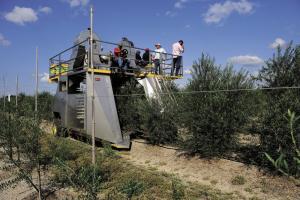2012 - Volume #36, Issue #2, Page #33
[ Sample Stories From This Issue | List of All Stories In This Issue | Print this story
| Read this issue]
Georgia Farmers Strike Oil With Olives
 |
“We had our first commercial crop of about 3 tons last year,” says Kevin Shaw, GOF.
Shaw and his cousins, Sam and Jason, are founding members of the co-op, planting their first orchard in 2009. Currently, they and other members have 84 acres under production, with the goal of up to 20,000 acres in the next few years.
The reason for the stepped goals is to make sure they can match milling capacity and marketing with production, explains Shaw. Key to their plans for creating a high value product is quality control.
“We want to keep the oil as fresh as possible,” he says. “Even novice olive oil tasters comment on how fresh our oil tastes.”
The co-op had only 500 bottles of oil available from their first crush and has been busy exposing celebrity chefs and others to build future demand. They expect to harvest 10 times as many olives in 2012 and up to 30 times as much within 4 years. By this fall’s harvest, GOF plans to have its own mill for processing the crop.
In addition, the co-op is selling three varieties of olive tree seedlings to interested growers. They estimate 50,000 trees have been planted to date. At 600 trees per acre, the number is likely higher, says Shaw, who has fielded calls from three growers wanting to put in trees this spring.
“We have a map of what we call the olive belt,” says Shaw. “It runs from as far north as the Carolinas to as far south as central Florida and west to Mississippi. We’ve had folks in Texas purchasing olive seedlings as well.”
Olives are already grown in Calif., Ore., Arizona and Texas. However, U.S. production is only about one percent of consumption. For the Shaws and GOF, that leaves lots of room for growth.
“We are working with farmers to establish olive orchards throughout the olive belt,” says Shaw. “GOF is an open co-op, and we welcome new members.”
While establishing their first orchards, GOF has also been evaluating watering systems, comparing varieties and developing harvesting equipment. Last year’s crop was picked with a modified blueberry harvester.
“There are olive harvesters on the market, but they cost two times as much as a blueberry harvester,” says Shaw. “We had to beef it up a lot to be aggressive enough for olives; yet it can still roll into a blueberry field and be used there.”
GOF members worked with consultants from around the world to develop the optimal template. Knowledge and skills learned, including the use of high-density production, are now being shared with others.
“Olives were a new crop for me” says Shaw. “We grow cotton, peanuts and corn. Olives take a different mindset, and we haven’t figured everything out yet. People who join in will be learning along with us.”
Contracts for growers are available. Turnkey support includes all services related to establishing an olive orchard. These can include location and purchase of land, site preparation, trees, bamboo and trellis for seedling support, posts, irrigation, planting management, harvesting and milling. GOF will also arrange for bottling, labeling, marketing and purchase of an orchard’s olive oil.
For pricing on trees contact Georgia Olive Tree Nursery.
Contact: FARM SHOW Followup, Georgia Olive Farms, 39 Valdosta Highway, P.O. Box 245, Lakeland, Ga. 31635 (ph 229 356-3647; kevin@georgiaolivefarms.com; www.georgiaolivefarms.com) or Georgia Olive Tree Nursery, P.O. Box 245, Lakeland, Ga. 31635 (ph 229 560-5615; sam@georgiaolivefarms.com).

Click here to download page story appeared in.

Click here to read entire issue
To read the rest of this story, download this issue below or click here to register with your account number.




